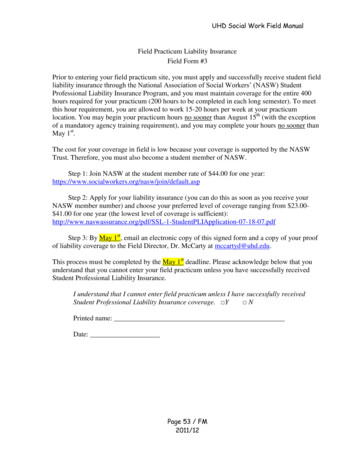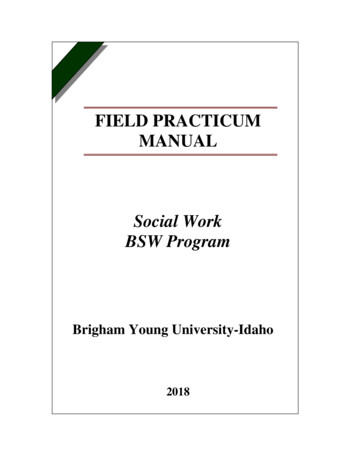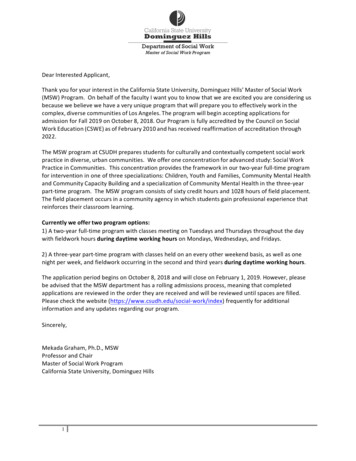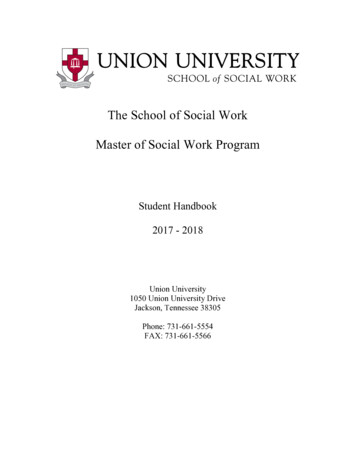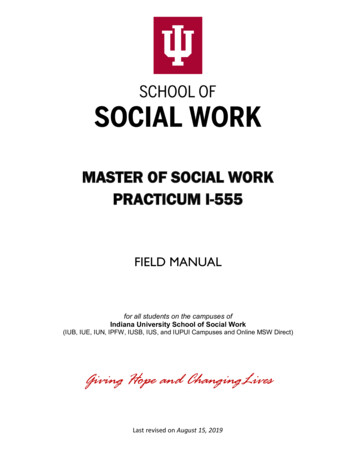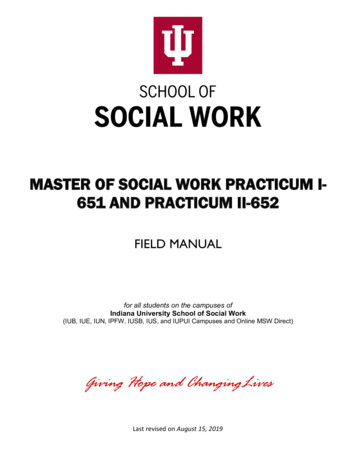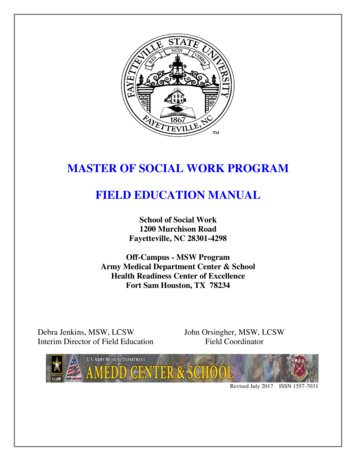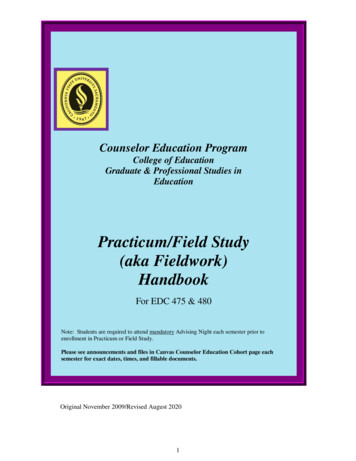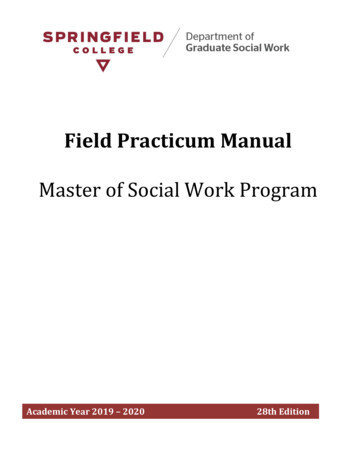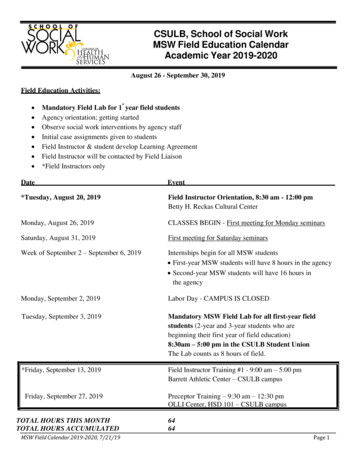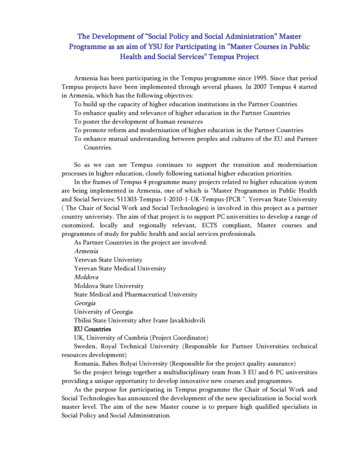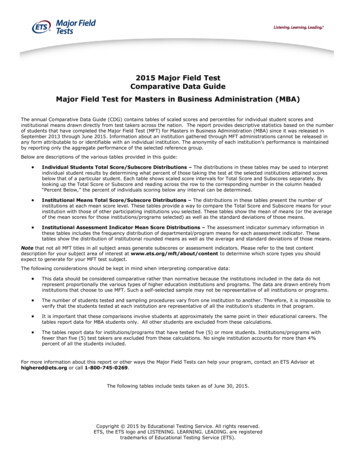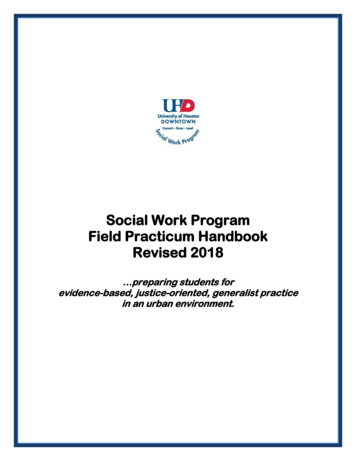
Transcription
Social Work ProgramField Practicum HandbookRevised 2018 preparing students forevidence-based, justice-oriented, generalist practicein an urban environment.
Social Work Field Practicum HandbookPreface. 3Social Work Program Mission . 3Social Work Program Vision . 3Program Goals. 3Generalist Practice Definition . 4Purpose of Field Practicum . 4Field Practicum and CSWE Competencies & Behaviors . 4Field Experience Philosophy of Knowledge . 7Required Field Education Hours & Course Work . 7Field Experience Administration and Evaluation . 8Performance Expectations for Field Experience . 8Academic Assessment . 9Professional Assessment . 10Academic Performance . 11Professional Performance. 11Admission Criteria . 14Field Practicum Eligibility Application and Placement Process . 15How to apply for and arrange Field Practicum . 15Field Practicum Liability Insurance . 16Field Practicum Agency Interviews . 16Field Experience Placement in Place of Employment . 17Roles and Responsibilities . 18Student . 18Agency . 19Agency Field Instructors . 19UHD Issues in Field Practicum Instructor . 21UHD Director of Field Education (DOFE) . 22Nondiscrimination and Human Diversity Policies . 23Appendix: Field Syllabi & Forms . 26SOCW 4301-Field Practicum 1 . 27SOCW 4302-Issues in Field Practicum 1. 36SOCW 4303 –Field Practicum 2 . 47SOCW 4304-Issues in Field Practicum 2. 56Field Practicum Eligibility Application . 65Agency Eligibility Application . 71Agency Field Instructor Eligibility Questionnaire . 74Field Practicum Interview Outcome . 77Student Evaluation of Field Instructor . 78Page 2 / Field Handbook2018
Social Work Field Practicum HandbookPrefaceThe UHD Social Work Program has met its candidacy for Accreditation by the Councilon Social Work Education, the accrediting body for schools of social work in the U.S.Any student who begins the program Fall 2009 or after will graduate from an accreditedprogram, Policies and procedures that have been revised from the previous manual affectall students.Social Work Program Missi onnThe mission of UHD’s Bachelor of Social Work Program is to prepare entry-levelsocial workers evidence-based, justice-oriented, generalist practice in an urbanenvironment.Social Work Program VisionPreparing Social Workers to address 21 century issues in the global environment.Program GoalsThe UHD Social Work Program has four program goals that are derived from ourprogram mission. The achievement of the following goals will ensure the fulfillment ofthe program’s mission to educate and prepare the next generation of social workers:1. To provide access to social work education to students from diverse backgrounds,cultures, and socioeconomic statuses, and prepare students for future professionaldevelopment and graduate study.2. To educate entry-level practitioners to the social work profession with an emphasison its unique history, values, and ethical base.3. To prepare baccalaureate-level social workers for culturally-sensitive, generalistpractice in an interconnected world.4. To promote understanding of urban and global social problems while preparingprofessional workers to empower, advocate, and otherwise meet the needs ofmarginalized populations and work for organizational and social change.Page 3 / Field Handbook2018
Social Work Field Practicum HandbookGeneralist Practice DefinitionThe BSW program at UHD defines and conceptualizes generalist practice as entry-levelsocial work practice in any human or public service area that has at its foundation both aglobal and social justice orientation, and is fully grounded in professional social workvalues and ethics. Students will be prepared to work with different sizes and types ofclient systems (individuals, groups, families, organizations, & communities) fromdiverse populations and utilize a variety of intervention modalities, including casemanagement and advocacy.Purpose of Field PracticumField Experience represents a bridge between the knowledge and experience gained inthe classroom to professional social work practice. It is intended as an opportunity forstudents to observe the application of social work techniques by seasoned professionals,to be mentored by experienced social workers, and to test newly acquired knowledgeand skills in an educationally supportive environment.Field Practicum and CSWE Competencies & BehaviorsField Practicum is a requirement by the Council on Social Work Education foraccredited programs. It is considered the “signature pedagogy of social work education”and fits into UHD’s BSW Program’s aim to offer students the fullest opportunity todevelop as professional social workers. Field Practicum complements the developmentof a generalist social worker as conceived by the BSW Program by addressing allprogram objectives. Over the course of Field Practicum 1 and 2 (SOCW 4301& 4303)and Issues in Field Practicum 1 and 2 (SOCW 4302 & 4304), all program goals andCSWE competencies are met. Please see the nine CSWE Competencies with theirassociated behaviors listed below:Competency 1: Demonstrate Ethical and Professional Behavior1. Make ethical decisions by applying the standards of the NASW Code of Ethics,relevant laws and regulations, models for ethical decision-making, ethical conduct ofresearch, and additional codes of ethics as appropriate to context;2. Use reflection and self-regulation to manage personal values and maintainprofessionalism in practice situations;3. Demonstrate professional demeanor in behavior; appearance; and oral, written, andelectronic communication;4. Use technology ethically and appropriately to facilitate practice outcomes; and5. Use supervision and consultation to guide professional judgment and behavior.Page 4 / Field Handbook2018
Social Work Field Practicum HandbookCompetency 2: Engage Diversity and Difference in Practice6. Apply and communicate understanding of the importance of diversity and differencein shaping life experiences in practice at the micro, mezzo, and macro levels;7. Present themselves as learners and engage clients and constituencies as experts oftheir own experiences; and8. Apply self-awareness and self-regulation to manage the influence of personal biasesand values in working with diverse clients and constituencies.Competency 3: Advance Human Rights and Social, Economic, and EnvironmentalJustice9. Apply their understanding of social, economic, and environmental justice toadvocate for human rights at the individual and system levels; and10. Engage in practices that advance social, economic, and environmental justice.Competency 4: Engage In Practice-informed Research and Research-informed Practice11. Use practice experience and theory to inform scientific inquiry and research;12. Apply critical thinking to engage in analysis of quantitative and qualitative researchmethods and research findings; and13. Use and translate research evidence to inform and improve practice, policy, andservice delivery.Competency 5: Engage in Policy Practice14. Identify social policy at the local, state, and federal level that impacts well-being,service delivery, and access to social services;15. Assess how social welfare and economic policies impact the delivery of and accessto social services;16. Apply critical thinking to analyze, formulate, and advocate for policies that advancehuman rights and social, economic, and environmental justice.Competency 6: Engage with Individuals, Families, Groups, Organizations, andCommunities17. Apply knowledge of human behavior and the social environment, person-inenvironment, and other multidisciplinary theoretical frameworks to engage withclients and constituencies; and18. Use empathy, reflection, and interpersonal skills to effectively engage diverse clientsand constituencies.Page 5 / Field Handbook2018
Social Work Field Practicum HandbookCompetency 7: Assess Individuals, Families, Groups, Organizations, and Communities19. Collect and organize data, and apply critical thinking to interpret information fromclients and constituencies;20. Apply knowledge of human behavior and the social environment, person-inenvironment, and other multidisciplinary theoretical frameworks in the analysis ofassessment data from clients and constituencies;21. Develop mutually agreed-on intervention goals and objectives based on the criticalassessment of strengths, needs, and challenges within clients and constituencies; and22. Select appropriate intervention strategies based on the assessment, researchknowledge, and values and preferences of clients and constituencies.Competency 8: Intervene with Individuals, Families, Groups, Organizations, andCommunities23. Critically choose and implement interventions to achieve practice goals and enhancecapacities of clients and constituencies;24. Apply knowledge of human behavior and the social environment, person-inenvironment, and other multidisciplinary theoretical frameworks in interventionswith clients and constituencies;25. Use inter-professional collaboration as appropriate to achieve beneficial practiceoutcomes;26. Negotiate, mediate, and advocate with and on behalf of diverse clients andconstituencies; and27. Facilitate effective transitions and endings that advance mutually agreed-on goals.Competency 9: Evaluate Practice with Individuals, Families, Groups, Organizations, andCommunities28. Select and use appropriate methods for evaluation of outcomes;29. Apply knowledge of human behavior and the social environment, person-inenvironment, and other multidisciplinary theoretical frameworks in the evaluation ofoutcomes;30. Critically analyze, monitor, and evaluate intervention and program processes andoutcomes; and31. Apply evaluation findings to improve practice effectiveness at the micro, mezzo, andmacro levels.Page 6 / Field Handbook2018
Social Work Field Practicum HandbookField Experience Philosophy of KnowledgeThrough field education and field placement, students demonstrate mastery of socialwork core competencies evident in the program’s goals and objectives. Field placementsites are chosen to provide opportunities for students to engage in supervised, entrylevel, ethical, and value-based practice with the diverse and globally representedimmigrant and native-born populations evident in Houston’s rich urban environment.Specifically, placements are chosen that provide optimum conditions in which toevaluate directly and indirectly student competence as they engage in professional multilevel practice that is appropriate, justice-oriented, and ethically informed.Through the procedures of field education, BSW students become integrated into theHouston community in all areas of social work practice based on the demonstratedmatch between UHD’s diverse student population, current community needs, andprojected population and demographic changes. To meet the specific needs of both ourstudent population and the Houston community, we have selected state, federal, andlocal public and private agencies and institutions that are compatible with program goalsand objectives. Specific types of agencies include those serving immigrant and urbanpopulations of different system sizes and service methodologies including family andchild welfare, aging, GLBT issues, education, mental and physical wellbeing, as well asthose providing and supporting political activism and advocacy across the social workspectrum.Required Field Education Hours & Course WorkStudents perform two field placements, each consisting of a minimum of 200 supervisedhours for a minimum total of 400 hours. Students completing the Traditional FieldPracticum schedule are engaged in their field setting concurrently with any remainingcourse work during the Fall and Spring Semesters before graduation. Studentscompleting the Summer Intensive Field Practicum schedule are engaged in their fieldpracticum courses only during the Summer Session before graduation. Studentscompleting the 8 8 Field Practicum schedule are engaged in their field settingconcurrently with any remaining course work during a long semester (Fall or Spring)before graduation. SOCW 4301: Field Practicum I, is a three credit-hour courseconsisting of a minimum of 200 hours of professionally supervised field experience.Students, under the supervision of an approved agency field instructor, engage ingeneralist social work practice with individuals, families, groups, organizations andcommunities. SOCW 4302: Issues in Field Practicum I, is a three credit-hour coursewith field assignments, projects, and papers that help students integrate and applyclassroom learning to their field experience. And it is a co-curricular course to SOCW4301. SOCW 4303: Field Practicum II, is a three credit-hour course that also requires aminimum of 200 hours of field experience. Building on SOCW 4301, this courseprovides additional supervised generalist social work field experience in the sameagency and on occasion at a new agency. Its co-requisite course SOCW 4304: Issues inField Practicum II builds on SOCW 4302 with additional field assignments, projects,Page 7 / Field Handbook2018
Social Work Field Practicum Handbookand papers that focus on skill and leadership development, the use of evidence-basedinterventions, practice evaluation, and a Professional Assessment and Reflection (PAR)project. In SOCW 4304, the content expands to incorporate a greater focus onprofessional development to include graduate school and employment readiness andlicensure exam preparation. Credit for field experience cannot be gained outside theapproved internship placement, through either volunteer or paid work in any othersetting. The Director of Field Education is responsible for all assignments to fieldsettings. (Note: Field Syllabi can be found in the Appendix.)Field Experience Administration and EvaluationTo administer field education, the Director of Field Education (DOFE) identifies,recruits, trains, and orients field agency site personnel who will provide the opportunityand appropriate supervision that BSW students need to demonstrate social work practicecompetence. The DOFE organizes and supervises the field selection process forstudents, working collaboratively to select an appropriate setting, and to provide acohesive experience through direct oversight the DOFE ensures that both Issues in FieldPracticum courses (SOCW 4302 and 4304) are taught by qualified, competent, andappropriate faculty (adjunct, instructor, or tenure track).During each semester of co-requisite courses: Field Practicum and Issues in FieldPracticum, a social work faculty member teaches the Issues in Field Practicum course.This individual also conducts two visits per site: one near the end of Field Practicum I tomonitor and perform a mid-field evaluation, and one near the end of Field Practicum IIas a final evaluation of the student’s performance in the field experience. Performanceexpectations are detailed in the field evaluation forms for each field practicum courseand the DOFE makes these forms available to the student and the agency field supervisorat the time of placement.Students are evaluated both in terms of academic achievement and professional conductand demeanor in courses, field practicum, social work student association participation,and in their formal and informal interactions with staff, faculty, students, fieldsupervisors, clients, and the community. Information regarding evaluation criteria usedto assess academic and professional performance is found in the following sources: theUHD Social Work Program Student Handbook, the Social Work Program FieldPracticum Handbook, and course syllabi.Performance Expectations for Field Experience:oArrive to the worksite, meetings, and appointments on time and complete all hours asscheduledo Dress appropriate to the work environment as guided by agency policy and practiceo Read and gain familiarity with agency handbook and policies and other assignedmaterialsPage 8 / Field Handbook2018
Social Work Field Practicum HandbookoComplete assignments on schedule or report any difficulty in doing so in a timelymannero Communicate and interact with field instructors, personnel, volunteers, and clientsusing professional language, tone and mannero Treat client information with confidentialityo Practice in accordance with social work values and ethics, respecting the dignity andwell-being of clientso Utilize supervisory sessions for professional development and to work through areasof confusiono Consult immediately with the agency supervisor
Program Goals The UHD Social Work Program has four program goals that are derived from our program mission. The achievement of the following goals will ensure the fulfillment of the program’s mission to educate and prepare the next generation of social workers: 1. To provide access to so
